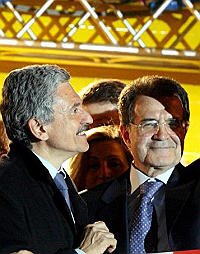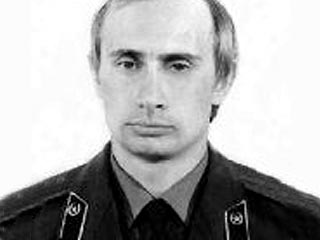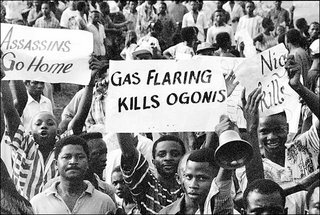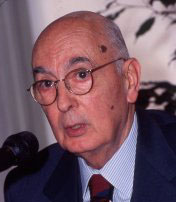E' stallo sull'elezione del prossimo Presidente della Repubblica dopo il prevedibile no di Ciampi. Oggi gli incontri tra il centro-destra e il centro-sinistra si sono risolti in un nulla di fatto. Vorrei sottolineare la nobile apertura di Romano Prodi. Un'apertura che Berlusconi dubito avrebbe fatto.

Intanto le consultazioni inizieranno lunedì. Per ora la Cdl ha puntato i piedi per respingere, in maniera molto miope, forse il solo candidato della sinistra in grado di fare loro alcune aperture. E' proprio per questo, ma da una diversa prospettiva, che sostengo l'elezione di Massimo D'Alema. Metterlo lassù potrebbe voler dire "congelarlo" e toglierlo dall'arena politica come concorrente. Concorrente, sì, perchè D'Alema ha un desiderio di governare che non l'ha più abbandonato dal 1999. Insomma (si spera) da lassù nessuna spinta maliziosa a Prodi e nessun ostacolo alla costruzione del Partito Democratico. Dalla prospettiva opposta, proprio ciò darebbe a D'Alema la possibilità di una maggiore apertura a destra. Due analisi diverse.
In ogni caso attorno alla vicenda D'Alema emergono due contraddizioni che vorrei portare alla ribalta:
- per la prima volta (sarà un segno?) nel no a D'Alema i radicali si trovano a braccetto con la Cei . Meditino;
- credo che Berlusconi capisca perfettamente quanto comodo sarebbe anche a loro avere D'Alema come Presidente della Repubblica: eppure non riesce a fare accettare alla base partitica lo sdoganamento di un "comunista che bollisce i bambini". Non è che Berlusconi sta cadendo vittima del suo stesso populismo e del suo linguaggio politico violento?
Meglio. In ogni caso come ha detto persino
Rutelli (!), dalla quarta votazione decidiamo noi.
Il Cordigliere
---------------------------------------------
(Fonte: Il Foglio)
La guerra è finita. O no?
Fassino ci spiega i termini di una intesa strategica sul governo del sistema
Roma. Piero Fassino si alza in piedi nel suo ufficio e legge un appunto. “Io la metto così: la guerra è finita, perciò la candidatura di D’Alema al Quirinale deve essere il primo atto di una pace da costruire e non l’ultimo atto di una guerra che continua”. Il destinatario del messaggio è anzitutto Silvio Berlusconi. A lui e all’intera Cdl il segretario dei Ds – parlando con il Foglio – chiede “di valutare alla luce del sole la possibilità di eleggere D’Alema alla presidenza della Repubblica”. Fassino chiede i voti della Cdl? “Certo. O comunque un’intesa graduabile in diverse forme, purché esplicite”. Il presupposto dell’iniziativa fassiniana è questo: “Il centrosinistra ha vinto le elezioni, ma sul filo di lana ed è innegabile che una metà del paese sia rappresentata dalla Cdl. Siccome l’Italia deve ritrovare la serenità che le consenta di essere una democrazia normale, di riprendere a crescere e uscire dalla precarietà, bisogna smetterla di pensare che se vince Berlusconi ci sia il fascismo alle porte; e da destra che, se vince l’Ulivo, alle porte ci sia il comunismo”. Come ha fatto in circostanze analoghe il premier inglese Blair a nome del governo laburista, così, dice Fassino, “il prossimo governo italiano si farà carico delle scelte di chi lo ha preceduto, nel nome dell’interesse nazionale”. Di questo percorso, secondo il segretario dei Ds, D’Alema, se e quando candidato al Quirinale, vuole farsi garante. “Non siamo una Repubblica presidenziale, né lo dobbiamo diventare. Ma è essenziale che il prossimo presidente svolga un ruolo di garanzia e di coesione che contribuisca ad un clima nuovo e ad aprire una nuova stagione nella vita delle istituzioni della Repubblica”. Fassino indica quattro punti fondamentali che riassumono queste sue intenzioni e le collegano al nome di D’Alema. Primo: “L’assicurazione che se il governo di Prodi dovesse entrare in crisi si tornerà a votare, in base al principio tipico delle democrazie dell’alternanza per cui la legittimità di una maggioranza e di un governo viene dal voto dei cittadini”. Secondo: “Da capo del Csm, un presidente che eserciti la funzione di garanzia operando – come ha fatto Ciampi – per evitare ogni possibile cortocircuito tra giustizia e politica”. Terzo: “Sulle grandi scelte di politica estera un presidente che favorisca la massima intesa possibile”. Quarto: “All’indomani del referendum che – come noi auspichiamo – boccerà la revisione costituzionale della destra, si riprenda un confronto tra le forze politiche sulle istituzioni che consenta di portare a conclusione una transizione istituzionale da troppi anni incompiuta”. Questo il manifesto presidenziale di un possibile candidato di nome D’Alema, che secondo Fassino potrebbe anche essere reso esplicito prima del voto delle Camere. L’obiezione è che il ruolo del presidente possa venire meglio interpretato da figure terze, “emerite” o di vecchia scuola o con venature tecniche. Come Giorgio Napolitano, Giuliano Amato, Mario Monti. In più, un certo establishment e alcuni poteri editoriali conservano delle riserve su D’Alema. Fassino: “Certo, non c’è una sola personalità capace d’interpretare bene il ruolo di presidente, ma siamo in un tornante politico molto delicato e una figura tecnica rischia di rivelarsi una soluzione che coprirebbe a stento le tensioni, senza peraltro impedire che diventino virulente ed esplodano. Meglio un presidente di chiaro profilo politico. Quanto agli ambienti che diffidano di D’Alema, i timori sono figli della coazione a ripetere per cui si diffida di ciò che non si conosce più di quanto si creda in ciò che è noto. Io vedo in D’Alema un uomo politico dal profilo riformista, nel quale può identificarsi il centrosinistra, ma che ha l’intelligenza e la capacità di cogliere e rappresentare anche le aspettative e le inquietudini del campo avverso”. Il D’Alema capo dello stato proposto da Fassino è “quello che ha presieduto la Bicamerale, quello che ha impegnato l’Italia nell’operazione internazionale in Kosovo, quello che gestì l’elezione bipartisan di Carlo Azeglio Ciampi e quello che ha sempre rifiutato di demonizzare il centrodestra”. E il centrodestra dovrebbe fidarsi? “Ai dirigenti del centrodestra chiediamo fiducia, sapendo che caricherebbero l’elezione dalemiana di un dovere in più, e anche pubblico, di onorare questa fiducia”. La sinistra militante e radicale ha già pronta l’accusa contro il nuovo inciucio. Ma Fassino insiste a dire che “tutto deve avvenire alla luce del sole” e preannuncia: “Non escludo affatto che lo stesso candidato dell’Unione, se e quando verrà scelto dopo adeguate consultazioni, possa anticipare il modo con cui si propone d’interpretare il proprio ruolo”. In altri termini D’Alema potrebbe presentare ai mille grandi elettori, che da lunedì voteranno, una specie di programma presidenziale sul quale chiedere un consenso diffuso. “E’ un’ipotesi che rappresenterebbe una innovazione importante”. In questo modo il Parlamento voterebbe sugli intenti futuri del candidato e non sulla storia di ieri del “comunista che divide”, come ha detto ieri il Cav. in campagna elettorale a Napoli. “Quelle dichiarazioni non mi impressionano, ma sono ancora espressione di una guerra che vogliamo superare per aprire un ciclo nuovo”. C’è pure un carattere da decrittare e D’Alema oscilla tra il decisionismo di Togliatti e gli strappi ammalianti ma non definitivi di Berlinguer. “D’Alema è spigoloso e a volte urticante. Ma è un vero laico, nel senso in cui lo intendo io dacché mio padre me lo spiegò quando ero quattordicenne: una persona in grado di cercare e cogliere il pezzo di verità che c’è anche negli individui più lontani da lui. D’Alema è un uomo leale. E, soprattutto, sa tener conto dei sentimenti della gente, ma non per questo si lascia frenare se la decisione del momento richiede fermezza e anche impopolarità. E sa onorare i patti”. Da uomo di parte, però. “Lo erano anche Pertini e Cossiga. Ma, per me, un uomo politico più è dotato di identità e profilo forte, più può onorare bene le responsabilità istituzionali dello statista”.


 Fu infatti il
Fu infatti il 



